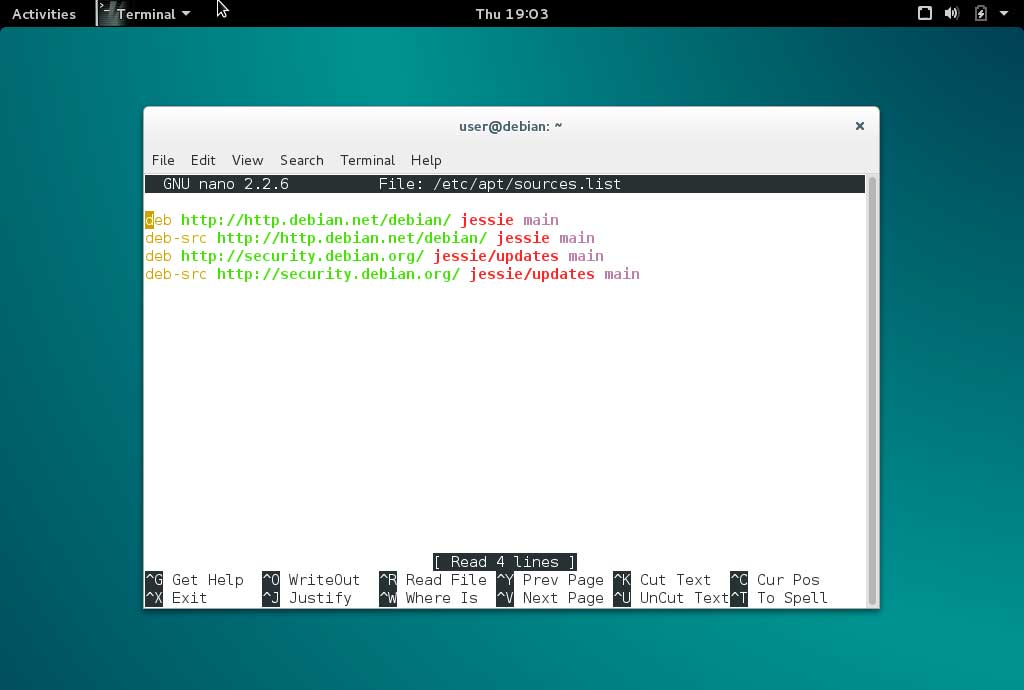
I understand the differences between wheezy / stable / testing etc. Are there any packages that are in that are not in /debian? And vice versa?Īfter the repository URI comes the component.

#Debian sources.list install
What's the point of having several repositories ( and )? I keep reading documentations about apt, but I don't find any explanations. list contains a list of configured APT (Advanced Package Tool) data sources to fetch packages from the Internet or local repository on a Debian or Ubuntu Linux. Install from APT repository Run the following command to update the list of available packages: Updates the list of available packages sudo apt-get update. My sources.list looks like this : deb wheezy mainĬan I remove the lines starting with "deb-src"? Am I correct if I say I don't need packages sources unless I want to modify them myself (which, obviously, i'm just not able to do)? If I understand well, when doing apt-get update & apt-get upgrade, apt will retrieve updates of my installed packages in the repositories listed in /etc/apt/sources.list. Instructions to connect to a third-party repository OpenPGP certificate distribution Sources.list entry Standard pinning Certificate rollover and updates Complete example Troubleshooting OpenPGP certificate handling Credits References OpenPGP certificate distribution Repositories MUST be signed with an OpenPGP certificate.
#Debian sources.list how to
I just got a private virtual server to host my websites, and i'm currently learning how to correctly secure a webserver. Get: 12 wheezy-updates/non-free Translation-en Ĭurrent status: 664 new. Get: 11 wheezy-updates/contrib Translation-en The information available from the configured sources is acquired by apt-get update (or by an equivalent command from another APT front-end). The file lists one source per line, with the most preferred source listed first.

Get: 10 wheezy-updates/non-free i386 Packages Adding new repositories involves editing the sources.list file and adding the correct Debian repository that the manufacturer of the soware provides. The source list /etc/apt/sources.list is designed to support any number of active sources and a variety of source media. Get: 9 wheezy-updates/contrib i386 Packages Get: 4 wheezy/updates/non-free Translation-en Get: 3 wheezy/updates/contrib Translation-en Get: 2 wheezy/updates/non-free i386 Packages Get: 1 wheezy/updates/contrib i386 Packages

Update the local package database with the new aptitude update # wheezy-updates, previously known as 'volatile'ĭeb wheezy-updates main contrib non-free #deb cdrom:/ wheezy mainĭeb wheezy/updates main contrib non-free The list of available repositories is stored in the configuration file /etc/apt/sources.list: Figure 1: F1sources-list.png: The sources.list file contains the addresses of all repositories used by a Debian system.
#Debian sources.list code
Alternatively, have a Live CD image ready and follow these instructions: Mount the CD. Debian Sources All Debian source are belong to us Anonymous Browse through the source code of the Debian operating system. And because we will not compile packages from the sources, these references (deb-src) can be deactivated (commented): 4 Answers Sorted by: 10 You can boot into a Live CD (a virtual machine will suffice) and copy /etc/apt/sources.list from it. To make future installation easier, the contrib and non-free repositories should be added to the list of available repositories.


 0 kommentar(er)
0 kommentar(er)
